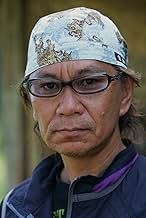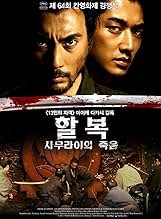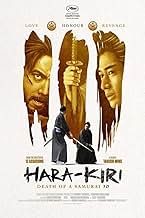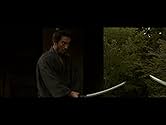AVALIAÇÃO DA IMDb
7,3/10
9,8 mil
SUA AVALIAÇÃO
Um conto de vingança, honra e desonra, centrado em um samurai pobre que descobre o destino de seu genro ronin, desencadeando uma tensa vingança contra a casa de um lorde feudal.Um conto de vingança, honra e desonra, centrado em um samurai pobre que descobre o destino de seu genro ronin, desencadeando uma tensa vingança contra a casa de um lorde feudal.Um conto de vingança, honra e desonra, centrado em um samurai pobre que descobre o destino de seu genro ronin, desencadeando uma tensa vingança contra a casa de um lorde feudal.
- Direção
- Roteiristas
- Artistas
- Prêmios
- 6 indicações no total
Eita Nagayama
- Motome Chijiiwa
- (as Eita)
Gorô Daimon
- Priest
- (as Goro Daimon)
- Direção
- Roteiristas
- Elenco e equipe completos
- Produção, bilheteria e muito mais no IMDbPro
Avaliações em destaque
The Japanese cinema used to be much more powerful in the past. This remake of classic masterpiece Harakiri is far worse in many ways. It toned down criticism of authority, that is the core of the original movie. The central story is overdrawn, and it does not bring much new. What is new in this presentation is almost always at a loss, spare a somewhat simpler structure. Acting is also better in the original. But what is most annoying, is that some key subtle points are missing in this version, almost as if they were not understood, or worse yet, almost if hypocrisy of the authorities is to be whitewashed. It is far less powerful rendering of the story, it lacks authenticity that Kobayashi had with his then contemporary comments. By all means, if you can, see the original first. One of the least justified and worst remakes. However, when the original is so great, this lazy if not outright stupid remake still leaves us with a somewhat shabby but not too bad a movie. It is a disappointment coming from a director that had better days, and especially from a cinematography that seems to have grown tired, and has been surpassed by South Korea but also China to an extent.
Let's get this out of the way.
Kobayashi's hard hitting "Harakiri" is a masterpiece. It's one of the great pieces of not only Japanese cinema, but also one of the best movies of the 20th century. While I'm disappointed the film was remade at all, and surprised it came from Miike, there are still good things to be found here. To my surprise, for the most part, this is a good movie and in very small quantities, there are some true moments of greatness. Even if they are very short.
A good deal of the original film's grit is lost for most of this go around. The cinematography is over-lit and the pacing falls into lulls. But survive to the end and you will be rewarded as the final irony is quite powerful. I mean, no spoilers from me, but even with the cheesy fake snow, I have to say, Ebizô Ichikawa's powerful presence won me over and he truly wins the day when the time calls for it.
I was never too crazy about all the Kurosawa remakes of the 60s and 70s. Fistful of Dollars always felt like a cheap knock-off, because it is. The Magnificent Seven was sort of a tolerable chuckle. Kurosawa's films were so human, almost populist, because of their themes, his work was ripe for remake, reboot or even plagiarism. Only Star Wars seemed to get the joke and succeed in being something different than a pure Hidden Fortress copy. Kobayashi's Harakiri seemed to escape the trend for so long because of the subject matter - even the title! But here we are. There is still something not right about this "remake," but MIike gets it right in the end, even if never needed to be done in the first place.
Kobayashi's hard hitting "Harakiri" is a masterpiece. It's one of the great pieces of not only Japanese cinema, but also one of the best movies of the 20th century. While I'm disappointed the film was remade at all, and surprised it came from Miike, there are still good things to be found here. To my surprise, for the most part, this is a good movie and in very small quantities, there are some true moments of greatness. Even if they are very short.
A good deal of the original film's grit is lost for most of this go around. The cinematography is over-lit and the pacing falls into lulls. But survive to the end and you will be rewarded as the final irony is quite powerful. I mean, no spoilers from me, but even with the cheesy fake snow, I have to say, Ebizô Ichikawa's powerful presence won me over and he truly wins the day when the time calls for it.
I was never too crazy about all the Kurosawa remakes of the 60s and 70s. Fistful of Dollars always felt like a cheap knock-off, because it is. The Magnificent Seven was sort of a tolerable chuckle. Kurosawa's films were so human, almost populist, because of their themes, his work was ripe for remake, reboot or even plagiarism. Only Star Wars seemed to get the joke and succeed in being something different than a pure Hidden Fortress copy. Kobayashi's Harakiri seemed to escape the trend for so long because of the subject matter - even the title! But here we are. There is still something not right about this "remake," but MIike gets it right in the end, even if never needed to be done in the first place.
This is the film about life and how hard it can be. What a true warrior should aim for and what does it mean to be a man of action. Very interesting film with an exceptional rhythm of story telling. At first flow of the film looked too slow for me, but after warming up I did truly enjoy it. As I got very sharp emotional feelings form this very melodramatic remake of Original Harakiri (1962), at the and of the film I've got a special gift, something which will be an interesting suggestion for life and a different angle of view for it.
Takashi Miike's second straight tribute to the samurai genre is a well-crafted and finely honed object. It's more consistent than Miike's previous samurai film, 13 Assassins, although that also means it lacks anything as great as that film's final battle. But what sets Hara-Kiri apart is its willingness to not just offer a pastiche of these films but genuinely question their values in a way that is still challenging to the contemporary viewer.
Through a series of events told partially in flashbacks, Hara-Kiri poses the question of how relevant our values are -- whether they be highly codified values like honour or the more nebulous instincts that guide us today -- in the face of human suffering. The ronin that we see humiliated and killed in the first act is not guilty of breaking some arcane samurai bylaw but of doing something most of us would find disgraceful. But as the film goes on it argues that we should hold compassion even for people such as this, and that honour is ultimately irrelevant in the face of social suffering. In an age of recession and austerity, where so many try to cling to their ideas of what they or other people "deserve", this is an important message.
It's an easy film to appreciate and a difficult one to love -- there's a kind of coldness to this set of Miike's movies that seems out of place with the gonzo enthusiasm of his earlier work. And doubtlessly it will be too slow and cerebral for some. But its critique of not just a canonized genre but the way in which we view ethics makes it well worth seeing.
Through a series of events told partially in flashbacks, Hara-Kiri poses the question of how relevant our values are -- whether they be highly codified values like honour or the more nebulous instincts that guide us today -- in the face of human suffering. The ronin that we see humiliated and killed in the first act is not guilty of breaking some arcane samurai bylaw but of doing something most of us would find disgraceful. But as the film goes on it argues that we should hold compassion even for people such as this, and that honour is ultimately irrelevant in the face of social suffering. In an age of recession and austerity, where so many try to cling to their ideas of what they or other people "deserve", this is an important message.
It's an easy film to appreciate and a difficult one to love -- there's a kind of coldness to this set of Miike's movies that seems out of place with the gonzo enthusiasm of his earlier work. And doubtlessly it will be too slow and cerebral for some. But its critique of not just a canonized genre but the way in which we view ethics makes it well worth seeing.
It's a good film. I didn't see the original and so I wasn't tainted by how they compare, or the book either. It probably made this film a little hard to understand because the chronology jumps around and there are a lot of flashbacks - but I stuck with it and it did begin to make sense. The movie is a basically a tragedy that also dissects the samurai code and provides some thought provoking material to consider. The movie is reasonably well paced and for a Japanophile the set design and costumes are very well done. I don't know if Japan was that squeaky clean and tidy 400 years ago, but it seemed well considered and accurate. The movie was a little slow but portrayed a sort of Zen tranquility, so it worked for the mood or atmosphere. You could pick apart this movie, and it may not stand up to the original but if you're a fan of Japanese cinema it's definitely worth seeing.
Você sabia?
- CuriosidadesThe first 3D title ever to be shown in official selection at the Cannes Film Festival.
- Erros de gravaçãoAs the wooden wakizashi is pushed into the stomach (after the tip snapped off), you can see that the blade is sliding into the handle.
- Citações
Hanshirô Tsugumo: A warrior's honor is not something simply worn for show!
- ConexõesFeatured in At the Movies: Cannes Film Festival 2011 (2011)
Principais escolhas
Faça login para avaliar e ver a lista de recomendações personalizadas
- How long is Hara-Kiri: Death of a Samurai?Fornecido pela Alexa
Detalhes
- Data de lançamento
- Países de origem
- Centrais de atendimento oficiais
- Idioma
- Também conhecido como
- Hara-Kiri: Death of a Samurai
- Empresas de produção
- Consulte mais créditos da empresa na IMDbPro
Bilheteria
- Faturamento bruto nos EUA e Canadá
- US$ 75.688
- Fim de semana de estreia nos EUA e Canadá
- US$ 10.920
- 22 de jul. de 2012
- Faturamento bruto mundial
- US$ 5.435.358
- Tempo de duração
- 2 h 8 min(128 min)
- Cor
- Mixagem de som
- Proporção
- 2.35 : 1
Contribua para esta página
Sugerir uma alteração ou adicionar conteúdo ausente



















